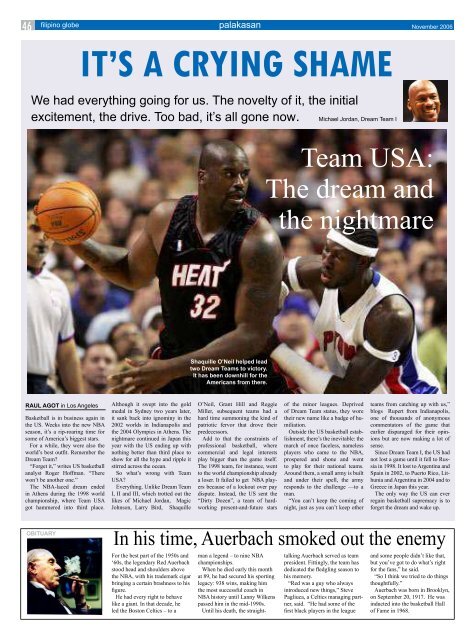Overseas
Nine million reasons to be closer together, closer to ... - filipino globe
Nine million reasons to be closer together, closer to ... - filipino globe
- No tags were found...
Create successful ePaper yourself
Turn your PDF publications into a flip-book with our unique Google optimized e-Paper software.
46<br />
filipino globe palakasan<br />
November 2006<br />
IT’S A CRYING SHAME<br />
We had everything going for us. The novelty of it, the initial<br />
excitement, the drive. Too bad, it’s all gone now. Michael Jordan, Dream Team I<br />
Team USA:<br />
The dream and<br />
the nightmare<br />
Shaquille O’Neil helped lead<br />
two Dream Teams to victory.<br />
It has been downhill for the<br />
Americans from there.<br />
RAUL AGOT in Los Angeles<br />
Basketball is in business again in<br />
the US. Weeks into the new NBA<br />
season, it’s a rip-roaring time for<br />
some of America’s biggest stars.<br />
For a while, they were also the<br />
world’s best outfit. Remember the<br />
Dream Team?<br />
“Forget it,” writes US basketball<br />
analyst Roger Hoffman. “There<br />
won’t be another one.”<br />
The NBA-laced dream ended<br />
in Athens during the 1998 world<br />
championship, where Team USA<br />
got hammered into third place.<br />
Although it swept into the gold<br />
medal in Sydney two years later,<br />
it sank back into ignominy in the<br />
2002 worlds in Indianapolis and<br />
the 2004 Olympics in Athens. The<br />
nightmare continued in Japan this<br />
year with the US ending up with<br />
nothing better than third place to<br />
show for all the hype and ripple it<br />
stirred across the ocean.<br />
So what’s wrong with Team<br />
USA?<br />
Everything. Unlike Dream Team<br />
I, II and III, which trotted out the<br />
likes of Michael Jordan, Magic<br />
Johnson, Larry Bird, Shaquille<br />
O’Neil, Grant Hill and Reggie<br />
Miller, subsequent teams had a<br />
hard time summoning the kind of<br />
patriotic fervor that drove their<br />
predecessors.<br />
Add to that the constraints of<br />
professional basketball, where<br />
commercial and legal interests<br />
play bigger than the game itself.<br />
The 1998 team, for instance, went<br />
to the world championship already<br />
a loser. It failed to get NBA players<br />
because of a lockout over pay<br />
dispute. Instead, the US sent the<br />
“Dirty Dozen”, a team of hardworking<br />
present-and-future stars<br />
of the minor leagues. Deprived<br />
of Dream Team status, they wore<br />
their new name like a badge of humiliation.<br />
Outside the US basketball establishment,<br />
there’s the inevitable: the<br />
march of once faceless, nameless<br />
players who came to the NBA,<br />
prospered and shone and went<br />
to play for their national teams.<br />
Around them, a small army is built<br />
and under their spell, the army<br />
responds to the challenge —to a<br />
man.<br />
“You can’t keep the coming of<br />
night, just as you can’t keep other<br />
teams from catching up with us,”<br />
blogs Rupert from Indianapolis,<br />
one of thousands of anonymous<br />
commentators of the game that<br />
earlier disparaged for their opinions<br />
but are now making a lot of<br />
sense.<br />
Since Dream Team I, the US had<br />
not lost a game until it fell to Russia<br />
in 1998. It lost to Argentina and<br />
Spain in 2002, to Puerto Rico, Lithunia<br />
and Argentina in 2004 and to<br />
Greece in Japan this year.<br />
The only way the US can ever<br />
regain basketball supremacy is to<br />
forget the dream and wake up.<br />
OBITUARY<br />
In his time, Auerbach smoked out the enemy<br />
For the best part of the 1950s and<br />
‘60s, the legendary Red Auerbach<br />
stood head and shoulders above<br />
the NBA, with his trademark cigar<br />
bringing a certain brashness to his<br />
figure.<br />
He had every right to behave<br />
like a giant. In that decade, he<br />
led the Boston Celtics – to a<br />
man a legend – to nine NBA<br />
championships.<br />
When he died early this month<br />
at 89, he had secured his sporting<br />
legacy: 938 wins, making him<br />
the most successful coach in<br />
NBA history until Lanny Wilkens<br />
passed him in the mid-1990s.<br />
Until his death, the straighttalking<br />
Auerbach served as team<br />
president. Fittingly, the team has<br />
dedicated the fledgling season to<br />
his memory.<br />
“Red was a guy who always<br />
introduced new things,” Steve<br />
Pagliuca, a Celtics managing partner,<br />
said. “He had some of the<br />
first black players in the league<br />
and some people didn’t like that,<br />
but you’ve got to do what’s right<br />
for the fans,” he said.<br />
“So I think we tried to do things<br />
thoughtfully.”<br />
Auerbach was born in Brooklyn,<br />
on September 20, 1917. He was<br />
inducted into the basketball Hall<br />
of Fame in 1968.






